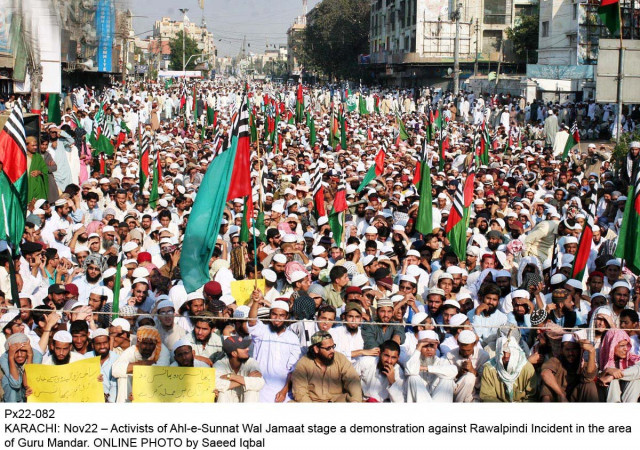Sectarian harmony: Despite fears, peaceful protests show solidarity
Leaders of both sects demand the government form a commission to probe the Rawalpindi incident.

Leaders of both sects demand the government form a commission to probe the Rawalpindi incident. PHOTO: ONLINE
Despite fears, religious organisations concluded their protests on Friday peacefully and sent a message of sectarian harmony.
Along with the rest of the country, several organisations — both Shia and Sunni — had announced demonstrations on Friday to protest the Ashura violence in Rawalpindi. The law enforcers in the city were on high alert to avoid any untoward situation, but the leaders gave messages of harmony and managed to mark their protests in a peaceful manner. SSP Pir Mohammad Shah said they were expecting violence in the city but, due to the efforts of the law enforcers, nothing happened.
The main demonstration was held outside the Khoja Isna Ashri Masjid in Kharadar on the call of Allama Raja Nasir Abbas Jafri of Majlis-e-Wahdat-e-Muslimeen (MWM). Along with Shia organisations, Sunni Tehreek, Jamiat Ulema-e-Pakistan and Sunni Ittehad Council also participated. The protesters carried banners and placards that were inscribed with slogans against terrorists, who they blamed for instigating violence during Ashura.

“Shias and Sunnis, both, are brothers and both condemn the Rawalpindi incident and its aftermath,” said MWM leader Allama Sadiq Raza Taqvi. “Terrorists of banned outfits do not want brotherhood between Shias and Sunnis.” The protesters demanded the government form a judicial commission to be headed by the Chief Justice of Pakistan to hold an inquiry into the Ashura tragedy in Pindi and the resulting arson.
A large number of people attended other demonstrations organised outside various mosques after Zuhr prayers in various neighbourhoods. Other organisations, such as Ahle Sunnat Wal Jamaat, Almi Majlis Tahafuz Khatam-e-Nabuwat and Jamiat Ulema-e-Islam (Samiul Haq) also held demonstrations at Guru Mandir after the Friday prayers.
The Sunni leaders presented 11 resolutions, in which they suggested limiting all religious processions to seminaries, forming a commission of religious representatives to probe the Rawalpindi incident, banning literature that instigates sectarian hatred, stopping drone attacks and Nato supplies, demanding the government take strict action against the police officers for extra judicial killings in ‘fake’ encounters, urging the government share facts of the Rawalpindi incident and paying compensation to the victims. “We will be compelled to stage a countrywide protest if our demands are not fulfilled,” announced ASWJ leader Allama Aurangzaib Farooqi.
The protesters managed to pass through the roads peacefully, except for Hassan Square and Sohrab Goth, where some of them pelted stones on vehicles.
In Hyderabad and Mirpurkhas too, the protesters marched through the roads after Friday prayers. At a press conference, ASWJ provincial leader Syed Asim Ali Shah condemned, what he described as, the killing of the party supporters in several parts of Sindh. “The ASWJ workers have been killed in Khairpur, Gambat and Shahdadkot,” he claimed. He also condemned the US drone strike on a religious seminary in Hangu, Khyber Pakhtunkhwa.
Separately, the workers of Majlis-i-Wahdatul Muslimeen also staged a demonstration at Qadam Gah of Hazrat Ali (RA) in Hyderabad. Led by their provincial leader Imdad Naseemi, the participants termed the Rawalpindi incident a conspiracy.
Lawyers boycott
The lawyers in Karachi and Hyderabad boycotted Friday proceedings to condemn the Rawalpindi incident. The members of the bar associations held condolence references for those who lost their lives in Rawalpindi.
Naeem Qureshi, the president of the Karachi Bar Association, said that the lawyers boycotted proceedings to express solidarity with the bereaved families. The government should give compensation to the bereaved families as well as the shop owners who suffered losses, he said. During their general body meeting, the KBA demanded the government give exemplary punishment to those responsible.
Due to the strike, the jail authorities also didn’t send prisoners to the courts. Prisoners as well as their families suffered as thousands of cases were put off due to the suspension of legal proceedings. In Hyderabad, the Sindh Bar Council called the strike.
Published in The Express Tribune, November 23rd, 2013.



















COMMENTS
Comments are moderated and generally will be posted if they are on-topic and not abusive.
For more information, please see our Comments FAQ